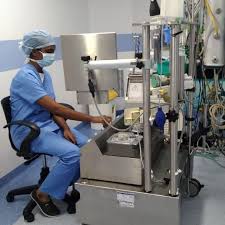
Diploma in Cardiopulmonary technician (1 year)
Diploma in Cardiopulmonary Technician – 1‑Year
1. Foundations of Anatomy, Physiology & Medical Terminology
- Basics of human anatomy & physiology with emphasis on respiratory and cardiovascular systems
- Essential medical terminology used in clinical and technical contexts
- Introduction to pharmacology, pathology, and microbiology relevant to cardiac and pulmonary care
2. Diagnostic Equipment & Techniques
- Principles and operation of ECG: components, electrode placement, waveform interpretation
- Echocardiography basics: M‑mode, 2D, Doppler, transesophageal echo fundamentals
- Exercise stress testing (TMT): protocol, indications, monitoring, safety
- Holter monitoring and tilt-table testing overview
3. Cardiac Pharmacology & Pathophysiology
- Common cardiovascular diseases (e.g., ischemia, CHF, arrhythmias)
- Cardiac drugs: types, indications, contraindications
- Cardiac emergencies and management protocols
- Acute care essentials, including BLS and ACLS principles
4. Invasive & Non‑Invasive Procedure Support
- Assisting with non-invasive procedures: ECG, Echo, TMT, Holter
- Exposure to invasive cardiac procedures: preparation for angiography, pacemaker implantation, electrophysiology studies, angioplasty support
- Use and maintenance of monitoring devices (multipara monitors, ventilators)
5. Practical Clinical Training
- Hands-on practice of vital monitoring, ECG, Echo, TMT, multipara monitors, cardiac catheterization
- BLS/ACLS drills and emergency response simulations
- Drug administration in ICU/CCU context
- Patient preparation and pre-/post-procedure care
6. Patient Care, Ethics & Communication
- Handling and positioning patients
- Patient preparation for procedures and post-procedural care
- Communication skills: interacting with patients and healthcare professionals
- Ethical conduct, legal aspects, and teamwork
7. Professional Skills & Healthcare Systems
- Introduction to research methods, record-keeping, documentation, stock management
- Familiarity with sterile practices and biomedical equipment maintenance
- Introduction to hospital workflows, career paths, and job readiness
8. Horizontal Integration & Mini‑Project / Review
- Integration of theory and practice emphasizing core competencies
- A mini-project or case study based on real-life patient care and monitoring scenarios
- Summary review, assessments, and readiness for clinical deployment

